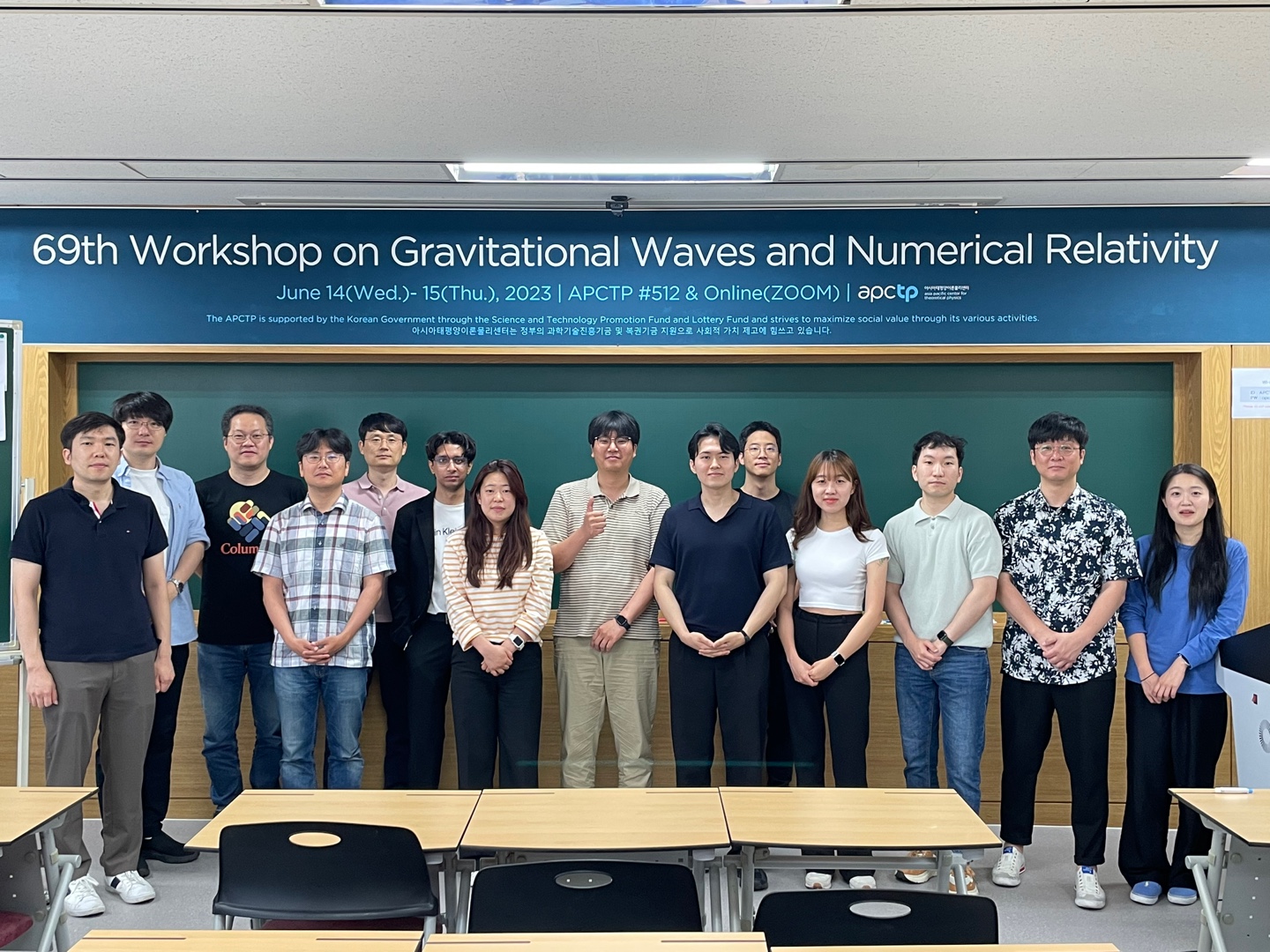Information
- Date: Jun. 14 (Wed.) - Jun. 15 (Thu.), 2023
- Venue: Rm #512, APCTP / Online (Hybrid)
- Accommodation: PIC
- Audience: Researchers and students in astrophysics
- Number of participants: 15 Offline / 15 Online
- Format: Long and intensive sessions from basic lecture to the latest research with a comfortable atmosphere to ask questions and discuss freely
- Sponsor: APCTP
- Contact
- Chan Park: iamparkchan at gmail dot com
- Jinho Kim: jkim at kasi dot re dot kr
Program
- Time zone: Korea Standard Time (UTC+09:00)
- Jun. 14 (Wed.)
- 14:00 - 14:25 [Student Session 1] Overview of Nuclear Astrophysics: In Search of the Origin of Elements (Chaeyeon Park, Ewha Womans University)
- 14:25 - 14:50 [Student Session 2] GECKO and 7DT: Gravitational-Wave Optical Follow-up Observation Campaign in Korea (Gregory SungHak Paek, SNU)
- 15:00 - 17:00 [Main Session 1] Stochastic gravitational waves and its detection (Chan Park, IBS)
- 17:00 - 18:00 Discussion
- Jun. 15 (Thu.)
- 10:00 - 12:00 [Main Session 2] Effects of eccentricity and aligned spins in the parameter estimation of CBC inspirals (Jeong Cho Kim, SNU)
Sessions
- Stochastic gravitational waves and its detection
- Speaker: Chan Park (IBS)
- Time: Jun. 14 (Wed.) 15:00 - 17:00
- Speaking Language: English
- Slide Language: English
- Abstract: The discovery of stochastic gravitational wave background from supermassive binaries is coming in the near future. Welcoming second big wave of gravitational wave science, we review stochastic gravitational waves and its detection methods. We also introduce practical applications including pulsar timing arrays and electromagnetic cavities.
- Slide File: Chan Park
- Effects of eccentricity and aligned spins in the parameter estimation of CBC inspirals
- Speaker: Jeong Cho Kim (SNU)
- Time: Jun. 15 (Thu.) 10:00 - 12:00
- Speaking Language: Korean
- Slide Language: English
- Abstract: So far, 90 gravitational waves have been observed, and many additional gravitational waves are expected to be detected in O4. A general introduction to gravitational wave parameter estimation, which estimates the physical parameter of a gravitational wave source from gravitational wave detection, and the latest research will be discussed. We performed Markov chain Monte Carlo parameter estimation (MCMC PE) using the TaylorF2 inspiral waveform with eccentricity corrections. In order to examine the effects of eccentricity in the existence of aligned spins, we considered two binary black holes (GW151226, GW170608) and one black hole - neutron star binary (GW200105). Our results show a clear advantage of having a long duration signal of the inspiral phase in parameter estimation. Also, larger spin magnitudes are helpful to constrain mass and eccentricity regardless of their relative directions. Effects of the spin directions are not as strong as the magnitudes.
- Slide File: Kim
- Overview of Nuclear Astrophysics: In Search of the Origin of Elements
- Speaker: Chaeyeon Park (Ewha Womans University)
- Time: Jun. 14 (Wed.) 14:00 - 14:25
- Speaking Language: English
- Slide Language: English
- Abstract: Nuclear Astrophysics, as a crossing point of nuclear physics and astrophysics, searches for how elements formed and evolved from the beginning of our universe to the recent stellar events. Thanks to the latest experiments performed with rare isotope beam facilities, the last decade has seen major progress allowing a further understanding of nucleosynthesis processes, such as the rapid proton capture process (rp-process) and the rapid neutron capture process (r-process). However, our knowledge of unstable nuclei is still behind of the precision the observations that have been made. This talk will introduce what and how nuclear astrophysicist address such interests. An example of experimental study of key nuclear reaction, 14O(α,p)17F will be presented.
- Slide File: Chaeyeon Park
- GECKO and 7DT: Gravitational-Wave Optical Follow-up Observation Campaign in Korea
- Speaker: Gregory SungHak Paek (SNU)
- Time: Jun. 14 (Wed.) 14:25 - 14:50
- Speaking Language: Korean
- Slide Language: English
- Abstract: The rapid identification of kilonovae (KN), the optical counterparts of gravitational-wave (GW) sources, is crucial for successful GW multi-messenger astronomy. With the ongoing O4 run, we expect numerous GW events accompanied by electromagnetic counterparts. However, the identification of kilonovae is challenging due to their faint and fast-decaying nature (within a few days) and the often poorly constrained GW localization maps. Typically, identifying a KN requires multi-epoch observations and extensive spectroscopic analyses among many possible candidates. This talk will introduce the Gravitational-Wave Electromagnetic-wave Counterpart in Korea (GECKO) campaign for GW rapid follow-up observations. We will also present the concept of our new wide-field spectroscopic imaging facility, the 7-dimensional telescope (7DT), designed to capture the early stages of kilonovae. We will discuss the strategies employed with our facilities and present preliminary follow-up results from the O4 run.
- Slide File: Paek
Supports
- Accommodation
- If you need accommodation support, select "Full accommodation support is required" in the registration form.
- Meals
- Dinner on Jun. 14
- Breakfast on Jun. 15
Registration
- Link: Google Form
- Due
- Accommodation support or reservation is required: May 31 (Wed.)
- Online participation or no accommodation: Jun. 13 (Tue.)
Photos

